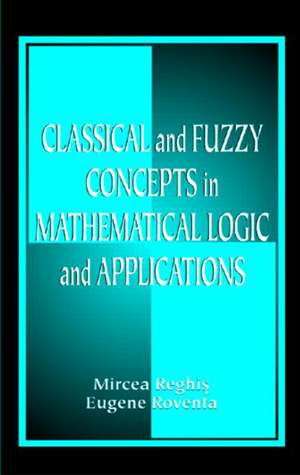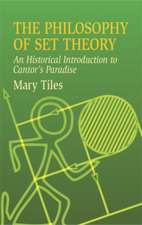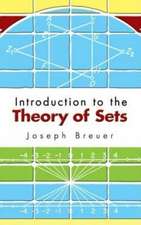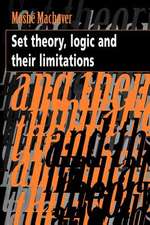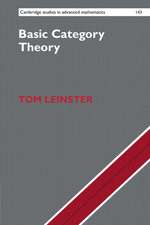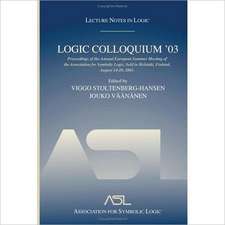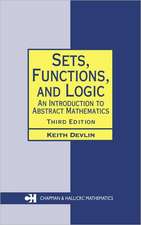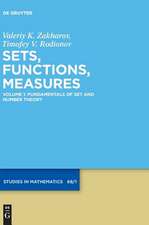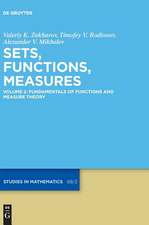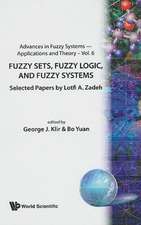Classical and Fuzzy Concepts in Mathematical Logic and Applications, Professional Version
Autor Mircea S. Reghis, Eugene Roventaen Limba Engleză Hardback – 20 mai 1998
Exploring the parallels between classical and fuzzy mathematical logic, the book examines the use of logic in computer science, addresses questions in automatic deduction, and describes efficient computer implementation of proof techniques.
Specific issues discussed include:
The authors consider that the teaching of logic for computer science is biased by the absence of motivations, comments, relevant and convincing examples, graphic aids, and the use of color to distinguish language and metalanguage. Classical and Fuzzy Concepts in Mathematical Logic and Applications discusses how the presence of these facts trigger a stirring, decisive insight into the understanding process. This view shapes this work, reflecting the authors' subjective balance between the scientific and pedagogic components of the textbook.
Usually, problems in logic lack relevance, creating a gap between classroom learning and applications to real-life problems. The book includes a variety of application-oriented problems at the end of almost every section, including programming problems in PROLOG III. With the possibility of carrying out proofs with PROLOG III and other software packages, readers will gain a first-hand experience and thus a deeper understanding of the idea of formal proof.
Preț: 827.47 lei
Preț vechi: 1034.34 lei
-20% Nou
Puncte Express: 1241
Preț estimativ în valută:
158.35€ • 164.32$ • 132.36£
158.35€ • 164.32$ • 132.36£
Carte tipărită la comandă
Livrare economică 15-29 martie
Preluare comenzi: 021 569.72.76
Specificații
ISBN-13: 9780849331978
ISBN-10: 0849331978
Pagini: 378
Ilustrații: illustrations
Dimensiuni: 156 x 234 x 25 mm
Greutate: 0.73 kg
Ediția:1
Editura: CRC Press
Colecția CRC Press
ISBN-10: 0849331978
Pagini: 378
Ilustrații: illustrations
Dimensiuni: 156 x 234 x 25 mm
Greutate: 0.73 kg
Ediția:1
Editura: CRC Press
Colecția CRC Press
Public țintă
ProfessionalCuprins
Preliminaries of "Naive" Mathematical Logic. Propositional Logic: The Formal Language of Propositional Logic. The Truth Structure on Lo in Semantic Version. The Truth Structure of Lo in Syntactic Version. Other Syntactic Versions of the Truth Structure on Lo. Elements of Fuzzy Propositional Logic. Applications in Computer Science. Exercises. Predicate Logic: Introductory Considerations. The Formal Language Predicate Logic. The Semantic Truth Structure on the Language L of Predicate Logic. The Syntactic Truth Structure on the Language L of Predicate Logic. Elements of Fuzzy Predicate Logic. Applications in Computer Science. Exercises. Boolean Algebras. MV-Algebras. General Considerations about Fuzzy Sets. Index.
Recenzii
"This textbook is useful for students at the advanced undergraduate level in mathematics, computer science and engineering; it could be helpful for university teachers, engineers and any person interested in learning and applying logical concepts."
--Quan Lei, Zentralblatt MATH, Vol. 944
--Quan Lei, Zentralblatt MATH, Vol. 944
Notă biografică
Mircea S. Reghis (Author) , Eugene Roventa (York University) (Author)
Descriere
Classical and Fuzzy Concepts in Mathematical Logic and Applications explains how to use the English language with logical responsibility, how to define and use formal language, and how to reason correctly. Specific issues examined include a discussion of propositional and predicate logic, logic networks, logic programming, proof of correctness, semantics, syntax, and theorems of Herbrand and Kalman. The text emphasizes the use of logic in computer science, addresses questions in automatic deduction, and introduces a systematic parallel between aspects of classical logic and fuzzy mathematical logic.
